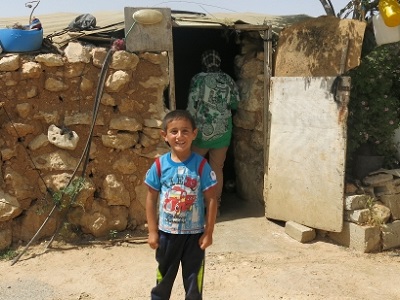
The Israeli Supreme Court is currently deciding the fate of an unrecognized Bedouin village in the South Hebron Hills in the occupied West Bank, scheduled to be demolished and its population transferred to an adjacent village in March 2018, according to a statement released Tuesday by Rabbis for Human Rights (RHR).
RHR said that the Israeli Supreme Court responded to a petition submitted by residents of the threatened Palestinian village of Dkeika in the West Bank with the assistance of RHR on Tuesday, issuing an order to the Israeli state to explain within 90 days its decision to reject a master plan that had been submitted by residents of Dkeika aimed at “legalizing” the village’s existence and development.
RHR explained that the petition has demanded that the residents be able to continue residing on their land by approving a master plan for the village or “another administrative solution,” that would be provided by the Israeli Civil Administration in order to prevent the expulsion of more than 300 residents.
Illegal squatters wandering in occupied #Hebron terrorizing Palestinians with guns!! #Terrorism pic.twitter.com/FHRoAklDJA
— eman qasim (@EmanQasim) July 15, 2017
“Israel does not recognize the village and refuses to approve the professional, village-initiated master plan that would allow residents to apply for building permits,” RHR said in the statement. “Left with no other recourse, villagers are forced to build ‘illegally.’”
However, the state has demanded that the village be demolished and its population transferred to the nearby village of Hmeida, which also does not have an approved master plan, and therefore must exist under the constant threat of Israeli demolitions.
“This means Dkeika’s residents will once again be vulnerable to the risk of forced transfer and further demolitions following implementation of the state’s ‘solution,’” the group said.
Israeli Soldier Who Executed Motionless Palestinian in Hebron Last Year Given House Arrest https://t.co/97GdliIkBp pic.twitter.com/QCytbNXnG4
— The IMEU (@theIMEU) July 17, 2017
Israeli rights group B’Tselem has reported that the Israeli Civil Administration’s goals in the South Hebron Hills, where some 30 Palestinian villages are located, is to prevent construction. “One way this is done is by not preparing master plans that would enable the legalization of existing construction as well as future development.”
Following the implementation of the Oslo Accords in the 1990s, Dkeika, like the rest of the South Hebron Hills, was designated as Area C — the more than 60 percent of the West Bank under full Israeli military control — and thus restricted from any developments without nearly impossible-to-obtain Israeli building permits.
B’Tselem has pointed out that the inability for the villages to obtain permits prevents residents from building housing, schools, medical clinics, and are prohibited from connecting to the power grid or water pipes that Israel has constructed in the area in order to serve Israeli settlements, established in the occupied Palestinian territory in violation of international law.
(Ma’an, PC, Social Media)




